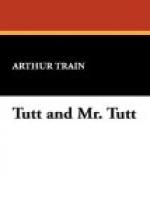“Second motion. Carried! All up—seventh inning!” smiled Mr. Scherer; and the directors, pocketing their gold pieces, arose.
If, as it has been defined, ethics consists of a “system of principles and rules concerning moral obligations and regard for the rights of others,” it may be interesting to speculate as to whether or not these gentlemen had any or not, and, if so, what it may have been. But in considering this somewhat nice question it should be borne in mind that Messrs. Scherer, Hunn, Greenbaum & Beck were bankers of standing, and were advised by a firm of attorneys of the highest reputation. On its face, and as it was about to be represented to the stockholders of Horse’s Neck, the proposition appeared fair enough.
The circular, shortly after sent out to all the names upon the list, stated succinctly that financial and labor conditions had been such that it had been found impossible to operate the mine profitably for several years, that it had depreciated greatly in value owing to the water which had accumulated in its lower levels, that it had exhausted its surplus, that a heavy indebtedness had accumulated, that the corporation’s outstanding notes had been protested and that the property would be sold under foreclosure unless money was immediately raised to pay them, the interest due and taxes; that half a million dollars was needed to put the property in operation and that there was no way to secure it, as nobody was willing to loan money to a bankrupt mining concern. That under these circumstances no practical method had been proposed except to organize a new corporation capitalized at one million instead of ten, to the stock of which each shareholder in Horse’s Neck might subscribe in proportion to his holdings, at par, and to which the assets of the old corporation should be transferred practically for its debts. That this, in a word, was the only way to save the situation and possibly make a go of a bad business, and that it was a gamble in which the old stockholders had a right, up to a certain date, to participate if they saw fit. Those that did not would find their stock in Horse’s Neck entirely valueless as it would have no assets left which had not been transferred to Lallapaloosa. Stockholders who were dissatisfied could protest against the enabling resolution to be offered at the annual meeting of the stockholders of Horse’s Neck to be held the following week at Wilmington, Delaware, and could avail themselves of the right to have their equity assessed under the laws of Delaware, but as the liabilities practically equaled the present value of the property that equity would naturally be highly problematical.
Now, as a matter of morals or of law the only thing that made the proposed reorganization unethical or inequitable was the single trifling fact that those responsible for it were the only ones who knew of the existence and proximity of the Amphalula vein. When a mining company, a railroad, an oil well or any other enterprise is down and out it is only fair that the majority stockholders, who are obliged to protect their investment, should have the right to call upon the rest to come forward and do their share or else drop out. A minority stockholder cannot appeal to any canon of fair play whereby he should be entitled to sit back and let the majority take all the risks and then claim his share of the profits.




